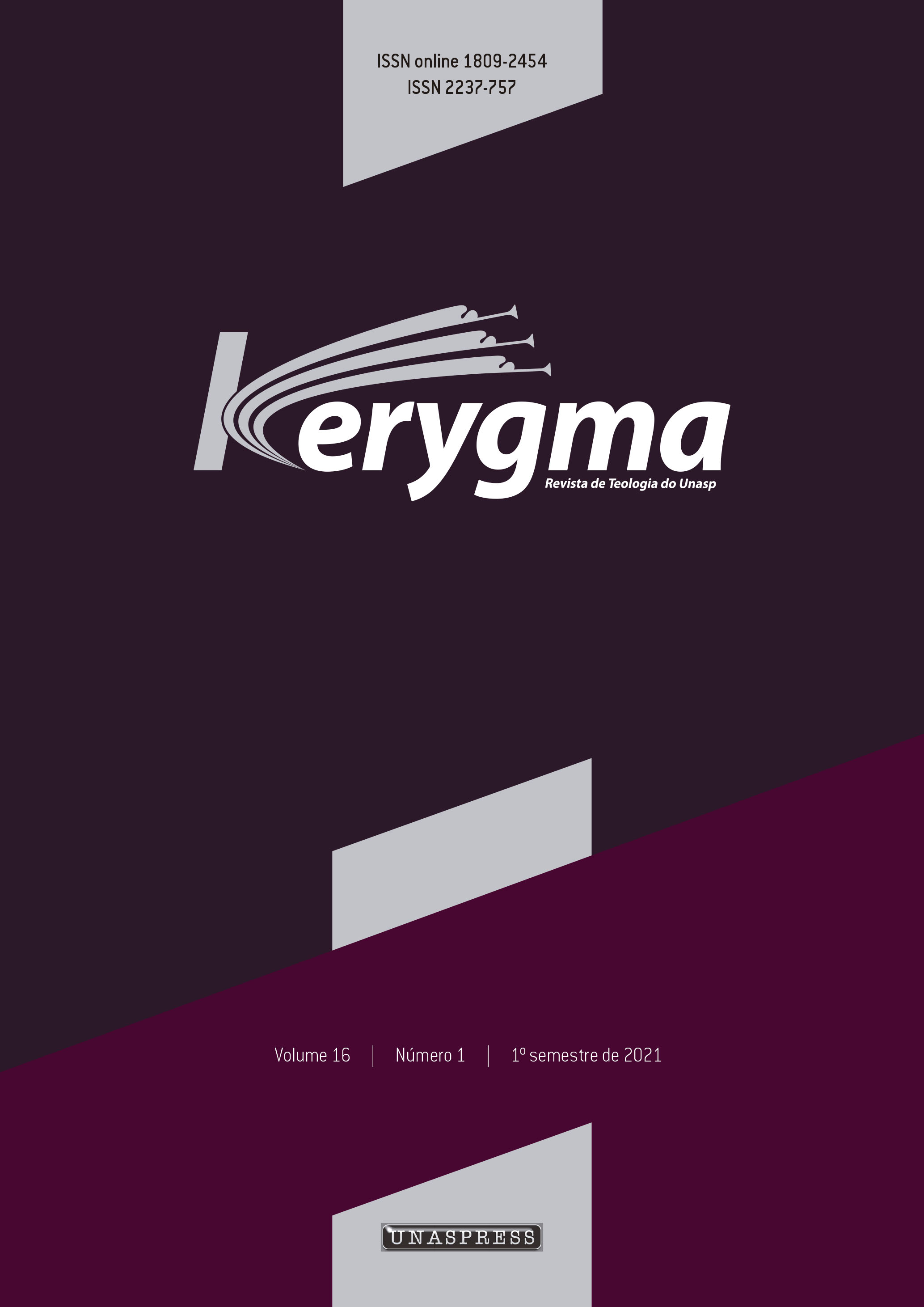SOTERIOLOGICAL DEVELOPMENT IN THE TORAH
DOI:
https://doi.org/10.19141/1809-2454.kerygma.v16.n1.p65-78Keywords:
Soteriology, Pentateuch, Salvation, TorahAbstract
The term "soteriology" is a technical term for the study of salvation. Such a study is generally regarded as something vast, due to the plurality of contexts to which the term can be applied, as in a secular and political sense, for example. In the Christian sphere, the term is inevitably related to Christ and his mission. Through this broad perception which embraces the theme, the present work seeks to analyze, briefly and briefly, how the theme of soteriology is defined and developed in the first five books of the Bible, keeping in mind its importance for the development of the soteriological conception of the rest of Scripture and for Theology as a whole. For this purpose, an analysis of the occurrences of terms from the semantic field of soteriology has been carried out in each of the books that make up Tôrāh, based on the descriptors exposed by Blazen (2011). It is, therefore, a research of documental analysis, based on the concepts extracted from a previous bibliographical review. After analyzing this material, as presented above, it is noted that the books that compose Tôrāh present a linear and progressive theological development, regarding the soteriological theme, where each book approaches one or more concepts in a more emphatic way.
Downloads
References
BARTON, J.; MUDDIMAN, J. The Oxford Bible Commentary, New York: Oxford University Press, 2007.
BÍBLIA DE ESTUDO ANDREWS. Tradução de Cecília Eller Nascimento. Tatuí: Casa Publicadora Brasileira, 2015.
BÍBLIA DE ESTUDO ALMEIDA. São Paulo: Sociedade Bíblica do Brasil, 2013.
BLAZEN, I. T. Salvação. In: Tratado de teologia Adventista do Sétimo Dia. Tatuí: Casa Publicadora Brasileira, 2011.
BROWN, R. E.; FITZMYER, J.; E. MURPHY, R. Novo Comentário Bíblico São Jerônimo: Antigo Testamento. São Paulo: Academia Cristã; Paulus, 2007.
ERICKSON, M. J. Teologia Sistemática. São Paulo: Vida Nova, 2015.
FERREIRA, J. S. Cristo nossa salvação: o que feito por nós e o que está disposto a fazer em nós. Niterói: Ados, 2006.
FINGUERMAN, A. A eleição de Israel: A polêmica entre judeus e cristãos sobre a doutrina do “povo eleito”. São Paulo: Associação Editorial Humanitas, 2005.
GRONINGEN, G. V A Família da Aliança. São Paulo: Cultura Cristã, 1997.
HOUSE, P. R. Teologia do Antigo Testamento. São Paulo: Academia Cristã; Paulus, 2005.
MACARTHUR, J. The MacArthur Bible Commentary. Tennessee: Thomas Nelson, 2005.
MCGRATH, A. E. Teologia Sistemática, Histórica e Filosófica: uma introdução à teologia cristã. São Paulo: Shedd, 2005.
MODES, J. V. A Salvação no Antigo Testamento: fé, e nada além dela, é que torna a mesma uma realidade! Revista Batista Pioneira, Belo Horizonte, v. 3, n. 1, p. 35-50, jun. 2014.
NICHOL, F. D. (org.). Comentário bíblico adventista do sétimo dia. Vol. 1. Tatuí: Casa Publicadora Brasileira, 2011.
PFEIFFER, C. F. Números. In.: Comentário Bíblico Moody Antigo Testamento. Grand Rapids: Editora Portavoz, 1981.
THOMAS, M. A. These are the Generations: Identity, Covenant, and the ‘toledot’ Formula. Reino Unido: T&T Clark. 2011.
THOMPSON. J.A. Deuteronômio: Introdução e comentário. São Paulo: Vida Nova, 1982.
VAZ, A. S. O vocabulário bíblico da redenção. Didaskalia, Lisboa, v. 14, n. 1, p. 55-76, 1984.
VON RAD, G. Teologia do Antigo Testamento. Vol. 1. São Paulo: Aste, 1973.
VON RAD, G. Deuteronomy: A Commentary. Vol. 5. Philadelphia: Westminster Press, 1966.
WARDISON, A.; TEIXEIRA, C. O desejo de Deus pelo homem: perspectivas histórico-teológicas no antigo testamento. Revista Eletrônica Espaço Teológico: Reveleto, São Paulo, v. 5, n. 8, p. 26-40, jul. 2011.
Downloads
Published
How to Cite
Issue
Section
License
Copyright (c) 2021 Kerygma

This work is licensed under a Creative Commons Attribution 4.0 International License.
Copyright Statement
In summary, authors who publish in Kerygma must agree that:
-
Once accepted for publication, the copyright of the articles is transferred to Kerygma.
-
All third-party materials used in the text must be properly referenced.
-
Authors must hold the rights or permissions for the use of images, tables, and other graphic materials.
-
Authors guarantee that the submitted manuscript is original, of their own authorship, and has not been submitted or published elsewhere.
-
The opinions and ideas expressed in the texts are the sole responsibility of the authors and do not necessarily reflect the views of the journal.
-
The editors reserve the right to make textual revisions and adjustments in accordance with the journal’s editorial standards.
-
Authors retain copyright and grant the journal the right of first publication, with the work licensed under the Creative Commons Attribution–NonCommercial 4.0 International License.
-
Authors authorize the reproduction and adaptation of the material by Kerygma, with the authors’ participation or express authorization when required.
-
The journal may distribute, store, archive, and make the articles available through any physical or digital means, whether free of charge or paid.
-
Authors may enter into separate agreements for the non-exclusive distribution of the published version of the work, provided that the original publication in Kerygma is acknowledged.
-
Full or partial reproduction of the texts in other publications requires prior written authorization from the editor.
-
Authors are permitted and encouraged to publish and distribute their work online (e.g., in institutional repositories or personal webpages) before or during the editorial process, as this may increase the visibility and citation impact of the published work.














